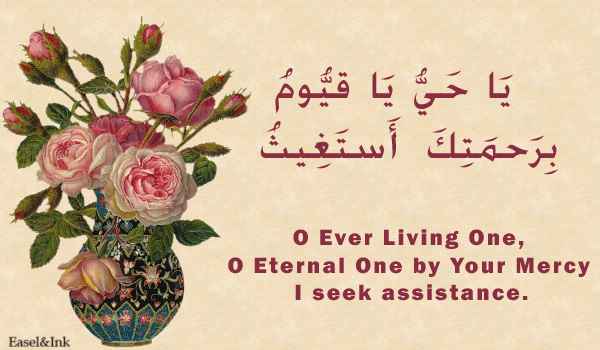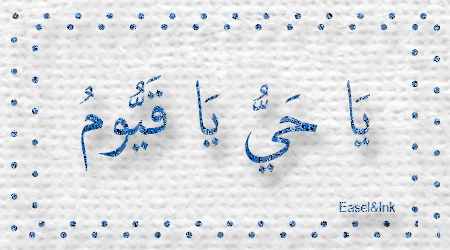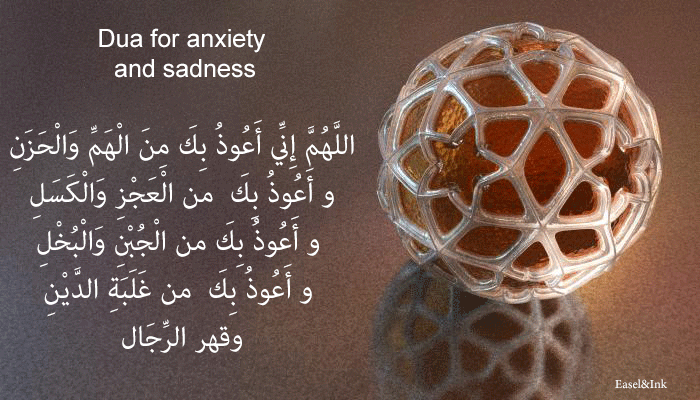At-Tirmidhi narrated on the authority of Sa'd

in a Marfu' form:
"A Muslim man never supplicates using the words of Dhun-Nun [1] except that it is answered.'[2] And in another version:
"Verily, I will teach you words which, whenever a person afflicted by grief says them, Allah will relieve him of it: They are the words of my brother, Jonah."[3]
And Abu Dawud has narrated that the Prophet

said to Abu Umamah

"Shall I not teach you words which, if you said them, Allah, the Almighty, the All-Powerful will remove your anxiety and discharge your debt? Say in the morning and at night:
"Allahumma Innee A'udhu Bika Minal-Hammi Wal-Hazni Wa A'udhu Bika Minal-'Ajzi Wal-Kasali Wa A'udhu Bika Minal-Jubni Wal-Bukhli Wa A'udhu Bika Min Ghalabatid-Daini Wa Qahrir-Rijal"
"Oh, Allah! I seek refuge with You from anxiety and sadness and I seek refuge with You from inability and laziness and I seek refuge with You from cowardice and miserliness and I seek refuge with You from being overcome by debt and from the oppression of men). (Abu Umamah

said: "So I did that and Allah, the Almighty, the All-Powerful removed my anxieties and discharged my debts."[4])
And Abu Dawud narrated on the authority of Ibn 'Abbas

in a Marfu' form:
"Whoever was constant in seeking forgiveness from Allah, Allah will make a release for him from every trouble and a way out for him from every oppression and He will sustain him from whence he does not expect."[5]
And in the 'Sunan':
"Jihad is an obligation upon you, for it is a gate from among the gates of Paradise, by which Allah removes anxiety and affliction."[6]
And in 'Al-Musnad' (by Imam Ahmad), it is reported that when something serious happened to the Messenger of Allah

would seek refuge in prayer. [7]
And it is reported from Ibn 'Abbas

in a Marfu' form:
"Whoever was seized by many anxieties and afflictions should repeat frequently the words:

''La Hawla. Wa La Quwwata Illa Billah"
"There is nor power and no strength except in Allah."
And it has been confirmed in the 'Saheehayn' that it (i.e. the saying:"La Hawla Wa La Quwwata Illa Billah'') "Is a treasure from among the treasures of Paradise." [8]
These medicines consist of fifteen effective ingredients, but if they are unable to remove the anxiety and sadness, then it has spread beyond control.
The first: 'Tihe affirmation of Allah's Oneness in matters of Lordship (Tawheed Ar-Rububiyyah).
The second: The affirmation of Allah's sole right to be worshipped (Tawheed Al-Uluhiyyah).
The third: Tawheed of knowledge.
The Fourth: The declaration that the Lord, Most High is far above committing injustice against His slave or seizing him without any cause on the part of the slave which would necessitate that.
The fifth: The slave's acknowledgement that it is he who is the wrongdoer.
The sixth: Seeking mediation with Allah (Tawassul) by the most, beloved thing to Allah which is by His Names and Attributes and the most comprehensive of them for the meanings of the Names of Attributes is: Al-Hayyu and Al-Qayyumu.
The seventh: Seeking help from Him Alone.
The eighth: The slave's affirmation of belief in Him by placing his hopes in Him.
The ninth: The affirmation of trust in Allah and dependence on Him (Tawakkul) and the acknowledgement of the slave that he is in Allah's Power and that His Command concerning him prevails and His Decision concerning him is just.
The tenth: That his heart takes pleasure in the garden of the Qur' an, like spring for animals and that he is enlightened by it in the darkness of doubts and uncertainties and that he is consoled by it against every calamity and he seeks a cure in it from the diseases of his heart and so it removes his sadness and cures his anxiety and grief.
The eleventh: Seeking forgiveness from Allah.
The twelfth: Repenting to Allah (Tawbah).
The thirteenth: Jihad.
The fourteenth: Prayer.
The fifteenth: The acceptance that man is without power or strength and the acknowledgement that they belong only to Allah.
[1] Dhun-Nun: Jonah (Yunus)

[2] Narrated by At-Tirmidhi and Ahmad on the authority of Sa'd Ibn Abi Waqqas

[3] See Surah Al-Anbiya' 21:87.
[4] Narrated by Abu Dawud, on the authority of Abu Umamah

it contains in its chain of narrators one Ghassan Ibn 'Awf Al-Basri, who is considered weak by As-Saji and Al-Azadi. Ibn Hajr described him as lax in Hadeeth.
[5] Narrated by Abu Dawud and Ibn Majah, on the authority of Ibn 'Abbas

It contains in its Sanad Al-Hakam Ibn Mus'ab, who is unknown, according to Abu Hatim Ar-Razi.
[6] Narrated by Ahmad, on the authority of 'Ubadah Ibn As-Samit

It was declared authentic. by Al-Hakim and Az-Zahabi confirmed this.
[7] Narrated by Ahmad, on the authority of Suhaib

[8] Narrated by Al-Bukhari and Muslim, on the authority of Abu Musa
 Pages 460-466
Pages 460-466








 Please check our
Please check our 





 Guidance in the Treatment of Worry, Anxiety and Sadness
Guidance in the Treatment of Worry, Anxiety and Sadness
 that the Messenger of Allah
that the Messenger of Allah 











 Provisions for the Hereafter -Zaad-al-Maad by Ibn Qayyim can be downloaded
Provisions for the Hereafter -Zaad-al-Maad by Ibn Qayyim can be downloaded